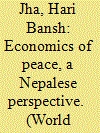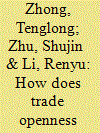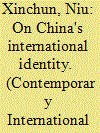| Srl | Item |
| 1 |
ID:
090110


|
|
|
|
|
| Publication |
2009.
|
| Summary/Abstract |
This paper investigates the impacts of financial intermediary (or banking) development on village-level per capita income using a Chinese dataset for selected years between 1993 and 2006. The empirical results from a random effect regression model indicate that mean per capita income in rural villages follows an inverted U-shaped path as financial intermediation develops. However, using a pooled quantile regression approach, we find that median per capita income in rural villages follows a positive linear path, rather than an inverted U-shaped path, as financial intermediation develops. The positive linear effect of financial intermediary development is observed at the lower and higher ends of the conditional per capita income distribution. This suggests that development of financial intermediation in China might not have statistically significant differential effects in low-income or high-income rural villages.
|
|
|
|
|
|
|
|
|
|
|
|
|
|
|
|
| 2 |
ID:
142019


|
|
|
|
|
| Summary/Abstract |
Within the context of the Period Fixed-Effects Model, this study of cigarette consumption in the US uses a state-level panel dataset to investigate a new hypothesis. This hypothesis argues that the presence in the home of minor-aged children, that is, children under 18 years of age, reduces the percentage of the population that smokes cigarettes. The eclectic model includes the levels of federal plus state cigarette excise taxation along with a number of other established explanatory variables. The empirical estimates in this preliminary study find support for the hypothesis proffered here, that is, it is found that the percentage of the population that smokes cigarettes is a decreasing function of the percentage of households with minor-aged children residing in the home. Moreover, aside from providing further insight into smoker behaviour, the results from this study also raise the question that since this phenomenon has been ignored in previous related studies involving such public policies as cigarette taxation and cigarette smoking bans that those studies may suffer from omitted variable bias.
|
|
|
|
|
|
|
|
|
|
|
|
|
|
|
|
| 3 |
ID:
118872


|
|
|
| 4 |
ID:
153057


|
|
|
|
|
| Summary/Abstract |
This paper investigates the effect of trade openness and other variables on the demographic transition in China using the instrumental variables regression method based on provincial panel data for the period between 1981 and 2013. The results indicate that trade openness is one of the determinants of China's demographic transition and has two distinct effects: (i) an income effect that accelerated the demographic transition by increasing per capita income; and (ii) a human capital effect that suppressed the demographic transition by reducing human capital accumulation. The effects of trade on demographic transition vary across different regions. This study identifies the important determinants of demographic transition in China's regions, and has rich policy implications for demographic transition and the upgrading of trade structure.
|
|
|
|
|
|
|
|
|
|
|
|
|
|
|
|
| 5 |
ID:
137442


|
|
|
| 6 |
ID:
126266


|
|
|
|
|
| Publication |
2014.
|
| Summary/Abstract |
South Korea's development over the last half century has been nothing short of spectacular. Fifty years ago, the country was poorer than Bolivia and Mozambique; today, it is richer than New Zealand and Spain, with a per capita income of almost $23,000. For 50 years, South Korea's economy has grown by an average of seven percent annually, contracting in only two of those years. In 1996, South Korea joined the Organization for Economic Cooperation and Development, the club of rich industrialized countries, and in 2010, it became the first Asian country and the first non-G-7 member to host a G-20 summit.
|
|
|
|
|
|
|
|
|
|
|
|
|
|
|
|
| 7 |
ID:
095424


|
|
|
|
|
| Publication |
2010.
|
| Summary/Abstract |
Many Americans-particularly those involved with the major news media, academia, and the world of policymaking-envision their country becoming an ever more predictable follower of global fashions in everything from health care to climate change, jurisprudence to economic policy. In other words, they look ahead and see a nation that is a somewhat larger version of those that make up the European Union.
But in reality, those who believe that the United States is sliding down from its historical apex-and that we must accordingly downscale our expectations and adopt the assumptions and economy more appropriate to our European friends-are wrong. American exceptionalism has lost none of its momentum, and the United States is becoming more, not less, distinct among the countries of the developed world in its economic, demographic, and cultural evolution
|
|
|
|
|
|
|
|
|
|
|
|
|
|
|
|
| 8 |
ID:
104271


|
|
|
|
|
| Publication |
2011.
|
| Summary/Abstract |
POVERTY as a complicated economic and social phenomenon with a frequently decisive political impact has traveled a long road to arrive at the top of international agenda. The international community recognized it as a worldwide phenomenon inherited from the distant past and the tribal system which has survived millennia to become the only mode of life for the majority of those living on Earth on the brink of physiological survival. Poverty is a sign of inadequate economic development and an unfair distribution of the national income.
|
|
|
|
|
|
|
|
|
|
|
|
|
|
|
|